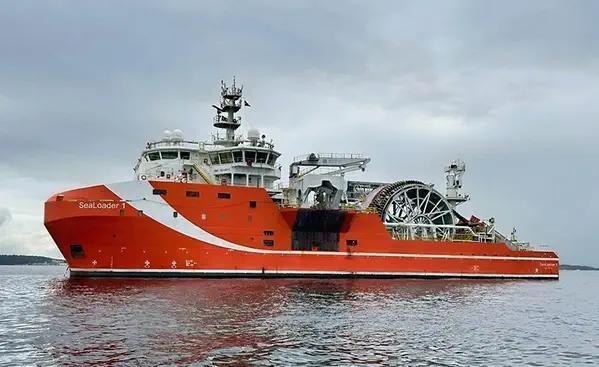Новая глава в передаче прав на бразильские оффшорные месторождения нефти
В водах у побережья Бразилии сейчас наблюдается примечательное событие: грузовое судно для перевалки грузов, принадлежащее Mitsui O.S.K. Lines (MOL), будет совместно использоваться двумя энергетическими гигантами — Shell Brasil Petróleo и TotalEnergies EP Brasil. Это сотрудничество расширяет функциональность MOL. SeaLoader 1, судно, специализирующееся на перегрузке сырой нефти с морских плавучих добывающих установок на танкеры.
Роль SeaLoader 1 в перевалке сырой нефти
SeaLoader 1, управляемый дочерней компанией MOL – SeaLoading Holding, является важной частью операций TotalEnergies с 2020 года. Расположенное в бассейне Сантос, судно облегчает перегрузку сырой нефти, добываемой плавучими установками для добычи, хранения и отгрузки (FPSO), на более крупные танкеры для дальнейшей транспортировки. Такая схема обеспечивает бесперебойную обработку нефти без докования FPSO для разгрузки, что экономит время и эксплуатационные расходы.
Shell объединяет усилия для повышения операционной эффективности
Благодаря недавнему соглашению, Shell получает право использовать SeaLoader 1 для работ по выгрузке сырой нефти в Бразилии. Этот шаг знаменует собой важную веху, поскольку сигнализирует об ускоренном внедрении технологии судов для перевалки грузов в регионе — метода, который обещает повышение эффективности и экологические преимущества.
Экологические и экономические преимущества перегрузочных судов
Традиционная транспортировка сырой нефти часто включает в себя танкеры-челноки, совершающие прямые рейсы к плавучим нефтедобывающим, хранилищным и отгрузочным комплексам (FPSO), что может приводить к большему потреблению топлива и увеличению выбросов. Использование специализированных судов для перевалки грузов, таких как SeaLoader 1, меняет правила игры:
- Сокращение выбросов CO2: Оптимизируя операции по перевалке, эти суда снижают потребление топлива, внося вклад в более экологичную цепочку поставок.
- Экономическая эффективность: Оптимизированная погрузка и разгрузка сокращают операционные задержки и снижают расходы, связанные с частотой рейсов танкеров-челноков.
Стратегия MOL по расширению парка судов для перевалки грузов направлена на дальнейшее укрепление партнерских отношений с крупнейшими нефтяными компаниями, предлагая более экологичный и эффективный способ обработки партий сырой нефти с морских добывающих установок на танкеры.
Операционное воздействие на логистику и цепочки поставок
Если посмотреть в целом, эффект от этого сотрудничества глубоко затрагивает логистику и грузоперевозки. Вот как:
| Аспект | Воздействие |
|---|---|
| Эффективность цепочки поставок | Более надежная и быстрая перевалка грузов снижает заторы, помогая поставкам нефти достигать мировых рынков с меньшим количеством сбоев. |
| Соблюдение экологических норм | Сокращение выбросов при перевалке грузов соответствует растущим экологическим стандартам в морских грузоперевозках и логистике. |
| Оптимизация затрат | Сокращение затрат на топливо и минимизация времени перевалки означают экономию для операторов, что может привести к снижению стоимости доставки для клиентов. |
| Использование автопарка | Позволяет крупнейшим нефтяным компаниям максимально эффективно использовать FPSO и челночные танкеры за счет сокращения времени простоя во время операций по перекачке. |
Почему это важно для грузовых и транспортных компаний
Для экспедиторов, перевозчиков и координаторов логистики улучшенная операционная частота, обещанная использованием судов для перевалки грузов, таких как SeaLoader 1, упрощает планирование и распределение ресурсов. Такая эффективность может помочь снизить неопределенность в графиках отгрузок, делая логистику более плавной от морских объектов до перерабатывающих и распределительных узлов.
Место сотрудничества в общей картине морской логистики
Это сотрудничество между MOL, Shell и TotalEnergies — это не просто совместное использование судна; это прокладывание пути к инновационному, совместному использованию ресурсов в грузовых морских перевозках — концепция, которая становится все более важной в современной глобализированной среде судоходства.
Общие активы, такие как SeaLoader 1, демонстрируют потенциал для того, чтобы логистические и грузовые операции стали более интеллектуальными и совместными, что является ключевым фактором оптимизации цепочек поставок и сокращения экологического следа по всему миру.
Что Выделяет Этот Проект: Краткое Описание
- Инновационное использование технологии перевалки грузов повышает эффективность логистики морской сырой нефти.
- Сокращение операционных расходов и выбросов соответствует глобальным целям устойчивого развития.
- Операционные синергии между крупными энергетическими компаниями поддерживают непрерывность и надежность циклов отгрузки нефти.
- Вносит вклад в эффективность, которая каскадом распространяется по более широким секторам грузовых и транспортно-экспедиторских перевозок.
В конечном счете, даже самые восторженные отчеты и подробные отзывы отрасли не могут полностью заменить опыт из первых рук. Для предприятий, занимающихся грузовая партия и международные грузоперевозки, использование платформ, предлагающих прозрачные, надежные и экономически эффективные транспортные решения, имеет решающее значение.
На сайте GetTransport.com, пользователи получают выгоду от широкого выбора транспортных услуг, адаптированных к самым разным потребностям — от переездов офисов и перевозок крупногабаритной мебели до транспортировки автомобилей и международных контейнерных перевозок — и все это по лучшим ценам в мире. Такая прозрачность и удобство позволяют клиентам принимать разумные логистические решения без ущерба для бюджета и без лишних хлопот. Забронируйте поездку с GetTransport.com чтобы ощутить беспроблемную грузоперевозку уже сегодня.
Взгляд в будущее: логистический ландшафт и инициатива MOL в отношении грузовых судов
Хотя это сотрудничество, возможно, и не перекроит мировую логистику в одночасье, его суть сигнализирует о растущей тенденции к совместному использованию активов и максимальной эффективности, за которой следует внимательно следить логистическим операторам и менеджерам по грузоперевозкам. Этот шаг отражает сдвиг в мышлении, который охватывает экологическую ответственность и экономическую эффективность — ценности, которые транспортная отрасль во всем мире все больше ценит.
GetTransport.com стремится отслеживать такие изменения, чтобы ее пользователи всегда были в курсе последних тенденций и наслаждались беспроблемными и доступными транспортными услугами в этом постоянно меняющемся мире. Начните планировать свою следующую доставку и обезопасьте свой груз с помощью GetTransport.com.
Заключение
Интеграция SeaLoader 1 от MOL между Shell и TotalEnergies знаменует собой многообещающий прогресс в методах перевалки грузов в открытом море, который оптимизирует операции по отгрузке сырой нефти, одновременно способствуя устойчивому развитию. Это партнерство не только снижает воздействие на окружающую среду и операционные расходы, но и повышает надежность и оперативность морской логистики. Для всех, кто занимается грузоперевозками — будь то транспортировка навалочных грузов, поддонов или крупного оборудования, — повышение эффективности таких технологий перевалки играет решающую роль в оптимизации цикла отправки и доставки по всему миру. Такие платформы, как GetTransport.com, упрощают организацию этих транспортных потребностей по доступной цене и эффективно, используя новейшие логистические инновации для обеспечения бесперебойного перемещения товаров по всему миру.

 How MOL’s SeaLoader 1 Vessel is Revolutionizing Crude Oil Transfers for Shell and TotalEnergies in Brazil">
How MOL’s SeaLoader 1 Vessel is Revolutionizing Crude Oil Transfers for Shell and TotalEnergies in Brazil">